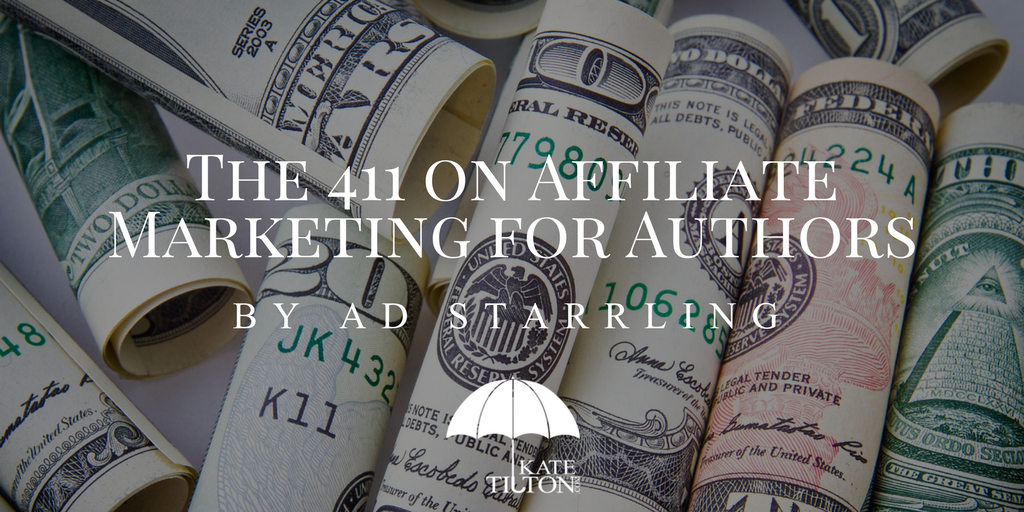
When you start researching ways to monetize your business, you’ll hear a lot of authors and industry folks talk about affiliate marketing, affiliate/associate programs, and affiliate links. So, let’s break this down into the big five: the What, the Why, the Who and the How, and the Where.
1. The What
A) What is affiliate marketing?
Affiliate marketing is the method whereby a parent company with products to sell, rewards its vendors with a small commission/referral fee for every sale said vendor makes for the parent company through the vendor’s own website or blog.
To make life easy, I’ll use the biggest company that authors become affiliated with, Amazon, in the following examples.
So, in simple terms, Amazon sells my book. Yes, I created the book, but Amazon is the retailer who sells it for me. I place an Amazon affiliate link for an Amazon product (my ebooks, my paperbacks, my audiobooks) on my website/blog. A reader visits my site, clicks on that link, and is redirected to the product page on Amazon. The reader buys my book or any other product from Amazon within the next 24 hours. Amazon gives me a small commission/referral fee for that sale.
Similarly, I could place affiliate links for other Amazon products on my website or blog (Kindle e-reader, non-fiction books, headphones, literally anything) and earn commission if someone visits my site, clicks on that link, and goes on to either buy that product or anything else in the next 24 hours on Amazon.
B) What is an affiliate/associate program?
An affiliate/associate program is an arrangement between a parent company who wants to generate more sales online and someone (a vendor) who wants to display the parent company’s products on their own site, the aim being to drive traffic and sales to the parent company’s site and earn commission on any sales that result. This agreement, if approved by the parent company whose program it is, will specify the terms of business between the two parties.
So an Amazon affiliate/associate program is where you register your interest in becoming a vendor for Amazon, fill in an online application, enter your bank/tax/website details, and sign a legal agreement to comply with Amazon’s terms of business. If Amazon approves you as a vendor, you then officially become an Amazon Affiliate and get an affiliate ID which you can use as mentioned above to link Amazon products on your website and receive a percentage back on any sales you generate.
C) What is an affiliate link?
An affiliate link is a special url that contains a vendor’s unique affiliate ID or username.
This is the url that you will place on your website or blog that will redirect to a product page on Amazon. It is specific to you and your agreement with Amazon. It will tell Amazon that this visitor came to that product page from your site and will pay you commission if the visitor goes on to buy that product or anything else on Amazon in the next 24 hours.
2. The Why
So, why should you bother to become an affiliate? You’re busy enough as it is writing your books, growing your mailing list, interacting with your readers, and finding ways to maintain/increase sales. Not to mention probably keeping the day job and looking after your family. You don’t have time to go through this hassle. You’re an author, not an internet marketer.
Er, yes, you are. If you sell ebooks, you’re an internet marketer. If you sell paperbacks through your website, you’re an internet marketer. If you sell the ashes of any moron who’s trolled you online, you’re an internet marketer. A sick, twisted one, but still, an internet marketer.
If you’ve bothered to set up a blog or a website that you use to showcase your brand and your products, and maybe even sell your products through an eCommerce online store, why the heck would you not monetize it by featuring other products related to your business that can earn you money on the side? All it takes is a few hours out of your busy schedule to set things up and minutes after that to add links to your site over time, and you could be set to make a monthly bonus income you had not planned for.
If that doesn’t convince you to consider affiliate marketing, maybe this will. For all you data hungry peeps out there, you can track things. Most affiliate programs provide in-depth analysis and reports that give you an insight into where your website/blog traffic is coming from, the conversion rates for the different methods you choose to display your affiliate links (there are several) and your visitors’ buying preferences and habits. All this can be incredibly useful marketing information, even for an author.
3 & 4. The Who and the How
So, I used Amazon in the example above since it’s the biggest company authors choose to enter an affiliate agreement with.
Did you know that Amazon currently has affiliate programs for 12 countries (US, UK, Canada, Germany, France, Italy, Spain, Japan, China, India, Mexico, and Brazil)? They’ve more than doubled that number in the two years since I first joined up and I’m sure they’ll add more as time goes by. The only problem with the Amazon affiliate programs is, once you sign up with one, you don’t automatically enter an agreement with all twelve countries. You have to enter into a separate agreement with each individual territory.
My advice? See where you get the most traffic and sales from and concentrate on those countries only.
Now, Amazon is not the only player in the field. iTunes, Nook, and Kobo also have their own affiliate programs, iTunes in pretty much every country in the world where they sell their products, while Kobo currently has six affiliate territories (Canada, US, UK, Australia, Germany, and France) and looks likely to add more in the future. (EDITORS NOTE: Although Kobo has different affiliate programs you only sign up for the one in the territory where you live. So if you live in the US sign up for the US program, if you live in Canda sign up for the Canada program, etc.)
And authors, like other internet marketers, are not limited to just online book retailers. You can request affiliate linking with influencers whose courses you want to advertise and other tools, software, and platforms you may use personally and are keen to showcase on your website/blog.
As to the how, simply visit the relevant sites I’ve linked to above, search for other sites and people relevant to your business you’re interested in affiliating with, read the instructions on how to join their affiliate programs, and fill in their application form. Make sure you have your tax and bank details handy. You can personally contact course providers and software/tool/platform providers who may not openly advertise their affiliate programs and ask them if they have one and how to join.
Once you’ve joined up, each program will show you how to search for the products you want to link to on their sites and how to create the links, banners, images, and widgets containing your special affiliate ID.
5. The Where
So, now that you’ve signed up for one or more affiliate programs and generated those special urls, where can you put them?
The obvious place is your website or blog.
The not so obvious places that have generated a lot of debate in the last few years among authors and bloggers are emails, RSS feeds, newsletters, your ebooks, and other offline places, as well as social media advertising programs such as Facebook Ads.
As far as Facebook Ads are concerned, the answer is yes, you can use affiliate links. See this super useful post about this here and note the way I’ve put a disclosure at the bottom of my blog page that should satisfy my affiliate programs.
As for other offline places, the answer is mostly no, and er, maybe. Affiliate programs’ terms of service change pretty regularly and can be confusing to interpret so check each program’s individual guidelines and email their customer service directly if things are still not clear. This guy did and got a pretty straight forward answer about affiliate links in ebooks.
The other alternative is to modify your affiliate links so they redirect to your website. Some authors and marketers use plugins like Pretty Link to do this.
Becoming an affiliate is a no brainer for an author who has a website or blog. You don’t have to do it straight away when you’re just starting out and learning the basic of publishing, but keep it in mind once you start to focus on sales and marketing. Although it won’t make up the bulk of your income, it sure can be a nice unexpected bonus on the side. Above all, it’s earning you money while you’re sleeping, with minimal input required from you beyond the initial set-up.
So the sky is the limit with affiliate marketing. On the other hand, don’t glut your site with so many affiliate links and banners readers can’t find YOU. Your website and blog still need to represent YOU and YOUR brand and products. It’s nice to have affiliate stuff on there though. Take a look around at Kate’s site and mine for how we balance affiliate links with our own content as an example. And now, I’m going to go and spend the 3-figure cheque I just got from one of my affiliate programs.


Leave a Reply